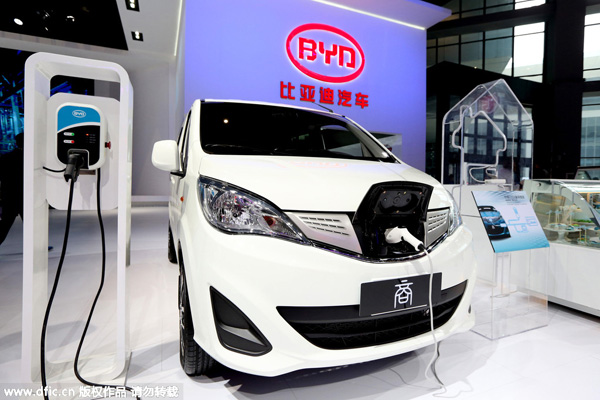 |
|
BYD's new energy vehicle is displayed during the 2015 Shanghai International Automobile Industry Exhibition. [Photo/IC] |
BEIJING?- The excitement of Chinese automaker BYD was palpable when the company announced an electric bus order from the United States this week.
"Positive energy will always win! Finally, we won the Long Beach Trans order - the only difference now is that the order is for 60 instead of 20! Cheers!" Li Ke, senior vice president of BYD posted on WeChat.
Long Beach Transit, which serves parts of the Los Angeles metropolitan area, announced an order for 10 BYD electric buses on Monday, with options for its partner agencies to buy as many as 50 more.
This is not BYD's first success overseas. The company has a reputation for top quality new energy vehicles (NEVs).
"We have been in the global market for a long time. We've been fighting for a place in the Japanese market for 10 years," Li Wei, marketing director of BYD's overseas business division, told Xinhua.
At present, BYD electric vehicles are marketed in more than 30 countries and regions. The company has sold more than 30 electric buses to the Netherlands since 2012 and will deliver to Los Angeles in the first half of this year.
Wang Jie, manager of the commercial vehicle sales, said it was hard for Chinese car makers to compete in the traditional vehicle sector, but they can catch up or even do better with NEVs through their own efforts.
Established in 1995, BYD specializes in information technology, automobiles and new energy, with products ranging from batteries and solar cells to vehicles. In 2010, the company joined with Daimler AG to create Shenzhen BYD Daimler New Technology Co Ltd, which markets luxury electric car brand Denza.
"When BYD first entered the global market, our brand recognition was very low," Li Wei. Now, the company's electric vehicles are certified in Europe, Canada and United States.
BYD's rise in the NEV sector comes as China is pushing use of such vehicles to save energy and cut pollution. The government started subsidizing NEVs in 2010 and last year announced plans to raise those subsidies. BYD sold more than 20,000 NEVs in China last year, 28 percent of total NEV sales.
"Our customers are mostly convinced by seeing electric cars and buses in the streets. Even the most strict administrative authority cannot find any fault with our products," Li Wei said.
BYD has also shaped itself into a provider of urban new energy transport solutions, designing several charge stations, including a tower that can contain 400 NEVs, with each floor of less than 600 square meters.
"We have the capability to provide distinctive urban transit solutions for the whole world," Wang said.
